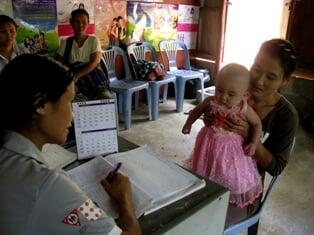SOB MOEI, Mae Hong Son Province, Thailand - A Karen couple with four children is seeking counselling on family planning, at a clinic in the Mae Ra Ma Luang refugee camp, along the Thai-Myanmar border.
“We want to do family planning, because we cannot afford to raise more children,” said the wife, adding that she feels depressed about the future of their four children in the refugee camp.
The youngest child, born last year, was “unintended’, the husband revealed. “We tried natural withdrawal, but it did not work,” he stated.
To ensure refugees have access to quality reproductive health services, UNFPA, the United Nations Population Fund in Thailand and its partners including Planned Parenthood Association of Thailand (PPAT) in 2012 set up 15 clinic centres, in three shelter camps hosting nearly 73,000 refugees.
With UNFPA's support, more than 18,000 refugees in the three camps received reproductive health services last year, including more than 10,000 for family planning.
As a result of the programme’s outreach work, refugees’ attitudes towards reproductive health have been changing. “Many refugees would like to receive more training to help their communities, ” said a PPAT staff member.
In spite of the progress made, many refugee women suffer from poor reproductive health, partly due to harsh living conditions, and a lack of knowledge on sexual and reproductive health and hygiene.
In 2013, UNFPA in Thailand expanded its programme into two additional refugee camps along the Thai-Myanmar border, aiming at increasing access to reproductive health services.


